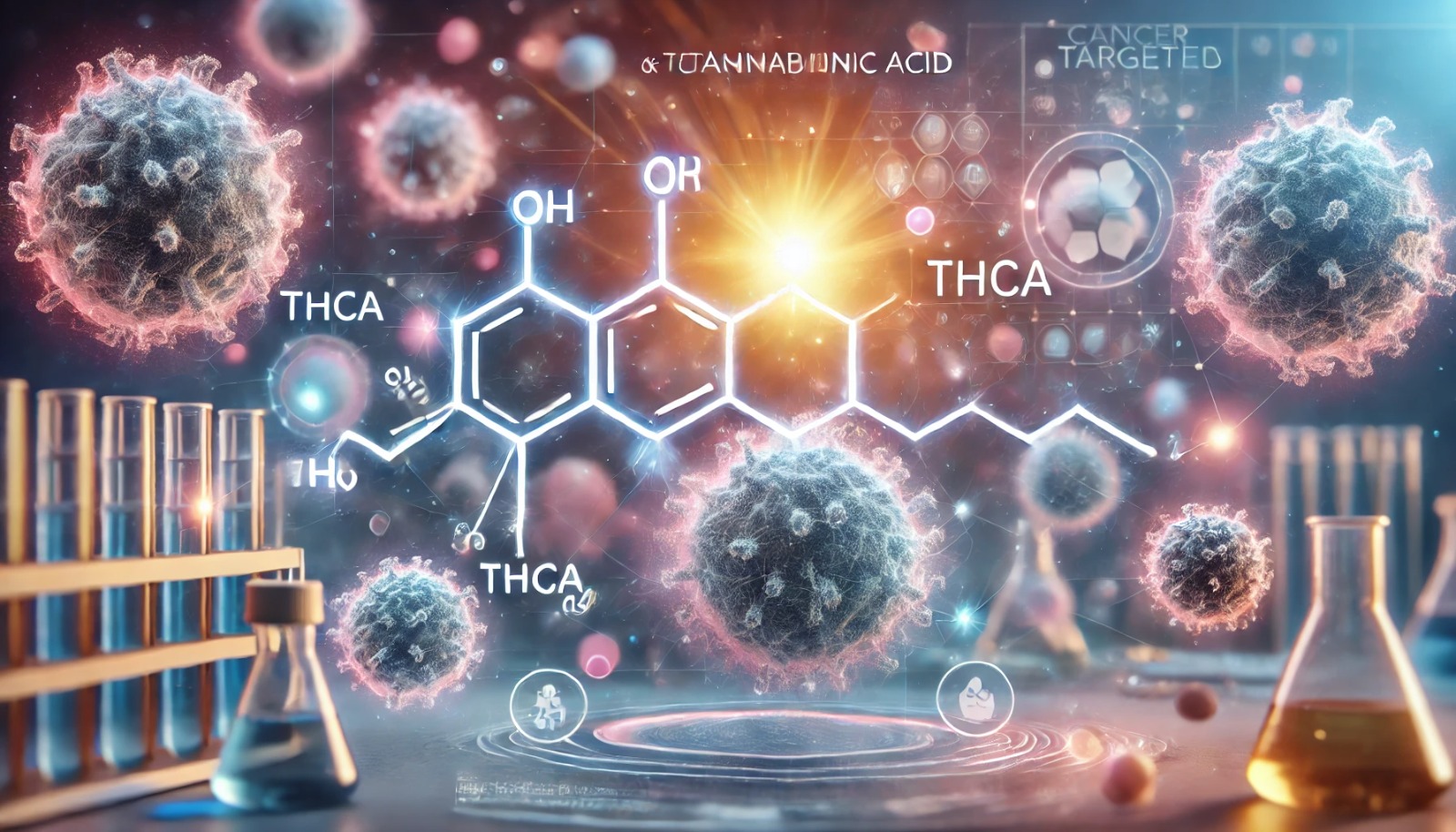
With increasing interest in cannabis as a therapeutic agent, THCA has emerged as a candidate for cancer treatment. THCA has no psychoactive effects and unlike its metabolite THC, seems to possess different health benefits. This blog looks at what the current body of research suggests about the use of THCA Flowers in the treatment of cancer. How it works, and what limitations researchers encounter at this time.
What is THCA?
THCA is a cannabinoid present in fresh cannabis plants and has not been synthesized yet. What stands out when using CBD is that it overcomes the psychoactive effect. Since it has not undergone decarboxylation a process that activates this compound. THCA is THC when cannabis is heated or aged so that the acids are reduced to plain THC. THCA has recently stirred interest because of its non-psychoactive benefits without the heinous side effects to its users.

The Mechanisms of THCA: How Might It Help Fight Cancer?
Treatment of cancer is not a one-standard process and may embrace different therapeutic processes; hence, it can interface several of THCA. While science is limited with regards to the product, it indicates that THCA binds with the body’s endocannabinoid system (ECS) that manages events like inflammation, the immune system, cell division etc. ECS has CB1 and CB2 receptors can have promoting or inhibitory effects for tumor depending on the activation.
- Anti-Inflammatory Effects
Since inflammation is known to play a role in tumour initiation and promotion. Thus, studying agents that reduce inflammation is important. The Maryland team found out that chronic inflammation affects DNA. It encourages the formation of abnormal cells and even promotes the development of a tumour. Studied effects of THCA Flower indicate that this compound may possess an anti-inflammatory action due to suppression of the activity of pro-inflammatory enzymes and cytokines. A study conducted in 2020 by Bhattacharyya et al in Scientific Reports establishes that, when used with other cannabinoids, THCA is useful in the suppression of inflammation in all the tested models.
- Anti-Proliferative Properties
THCA has been known to give some enforcement on cancer cell proliferation. Also referred to as the process of growth of cells many times as a result of damage forming tumors. THCA as a result of previous laboratory studies has been shown to inhibit growth of some types of cancer cells. In 2017 a study of the effect of THCA for glioblastoma, an aggressive type of brain cancer, suggested that it somehow decreases the rate of growth of these cells through its effect on cell cycle. These findings are refreshing albeit preclinical studies therefore, more research is required.
- Apoptosis Induction
The process of apoptosis is important in eliminating the threat of cancer cells spreading with the assistance of other cells. In some of the cancers, there is somehow a disturbance in the normal process of apoptosis. Resulting in extension of lifespan of such unwanted cells. Proof from exploratory research shows that THCA Flower has potential to encourage the cancer cells to undergo apoptosis. For instance, a journal in Frontiers in Pharmacology showed that THCA caused apoptosis in breast cancer cell cultures. Although it has not yet been well established in people.
- Interaction with CB1 and CB2 Receptors
The CB1 and CB2 receptors belonging to ECS are particularly engaged by cannabinoids. THCA, for that reason, seems to have a weak binding affinity toward these receptors. Thus, these suggests that it could operate through different channels or indirectly act on the ECS. This novel system indicates that THCA may present another approach to oncology which may decrease general tumour formation. Along with decreasing some of the potential side effects connected with high-THC medicines. Data is being collected as to how THCA may trigger these receptors in a way that THC or other cannabinoids may not, with implications to cancer prognosis.
Current Research: What Are the Findings?
Studies in Animal Models
Much of the research on THCA in cancer treatment is in animal models, specifically mice. For example, a cross-sectional study of a mouse model of colorectal cancer published in 2019, concluded that THCA Flower showed promising results. Including decrease in size and metastatic activity of the tumours. It was possible to conclude that THCA could have action leading to decrease of tumor invasiveness. And therefore, lead to better survival rates. However, those findings based on animal studies are usually in the first place and can give various results in human studies.
Cell Line Studies
Cancer cell line investigations are employed to provide initial data before case investigations. A paper done in 2021 specifically on prostate cancer cell lines showed that THCA suppressed cell division and caused cell death. Lung cancer cells were also targeted in another study. Where it was found that THCA reduced cell proliferation but high doses could mean a difference impact. These studies are, however, encouraging and reveal that the efficacy of THCA Flower is not so simple when it comes to the impact on various types of cancer cells.
Human Studies
Surprisingly, there are not many human trials when it comes to THCA. Cancer patients as a group seem to stand to gain from THCA. However, as stated above, evidence is still largely anecdotal. Challenges posed by regulation plus the psychoactive effects of cannabis means that it has been hard for researchers to conduct human trials of THCA for cancer treatment. However, other cannabinoids are still under research to prove safety and efficiency for cancer patients.
THCA Flower Benefits in Symptom Management for Cancer Patients
Besides the direct effect on cancer cells, THCA Flower might have several advantages when it comes to cancer symptoms and side effects of treatment.
- Pain Relief
Cancer patients will always complain of pain as they undergo treatment such as chemotherapy that is invasive in nature. Research suggests that THCA Flower may have pain relief potential. Primarily through its anti-inflammatory effects and agonism at the ECS. While not as effective as THC in managing pain. THCA Flower may be ideal for anyone in need of a pain reliever with no hallucinogenic effects.
- Anti-Nausea and Appetite Stimulation
THCA is also explored also for its effectiveness in the treatment of side effects of cancer treatments such as nausea and loss of appetite. A study conducted on rats in the Psychopharmacology journal argues that while THCA was superior to THC in alleviating nausea. It is still in its infancy in human study. However, this points to the potential of THCA being a better option for patients who wish to avoid the potency of THC.
- Improved Sleep
Patients with cancer suffer from either poor sleep quality or insomnia. Such complications are usually as a consequence of pain, stress or complications resulting from treatments. Before giving the prognosis it should be noted that primary research shows positive results in the sphere of the influence of THCA Flower on improving the quality of sleep. But here also the effectiveness largely may depend on the dosage试 and individual sensitivity of the patient.
Challenges and Limitations of THCA in Cancer Treatment
The major cons of using THCA in cancer treatment are as followsилась
- Limited Research and Funding
Compared with other forms of the cannabinoids such as CBD, there is limited data available on the use of THCA in cancer treatment. This makes it difficult to establish conclusive findings on its efficacy as a cancer treatment option. Research conducted on THCA is somewhat scarce. Which in large part due to legal and funding constraints. Most of the data obtained here are preclinical and not clinical. This means that the evidence on the effects and safety of THCA in cancer patients is limited.
- Lack of Standardized Dosing
One of the main problematic issues concerning THCA research is The lack of standardized dosing. Most relevant evidence lacks detailed description of dose targets. Which may lead to a lack of clear recommendations on the use of THCA for health care providers and patients. Further, the stability of THCA is an issue. Because it can be degrading to THC when exposed to heat, light and improper storage condition.
- Potential Drug Interactions
A condition that most cancer patients develop will be on the use of multiple medicines. Whereby the medicines will cause an interaction with THCA. For instance, many argue that THCA may interfere with the enzymes acting on drugs thus changing the efficacy of a particular drug. Further study of these interactions is required to develop recommendations for safe THCA utilization for cancer patients.
What’s Next for THCA in Cancer Research?
There are positive but inconclusive results. It may be concluded that THCA research in cancer treatment seems to have reached a crucial point. Higher demand from medical practitioners and patient organizations may play a role to bring more human trials in the next few years. Scientists now plan to deepen our understanding of how THCA affects the cancer cells. And the endocannabinoid system to develop new types of cancer treatment that will not pose the same number of side effects as present cancer treatments do.
Final Word
THCA may be helpful for symptom relief and is considered as adjuvant therapy in cancer. However, the current study, as most publishing today, is mostly of a preclinical nature. Although THCA Flower displays ant-inflammatory, ant-proliferative and apoptosis effects in cell and animal research. Still, large-scale human controlled clinical trials are required to evaluate its efficacy and side effects.
However, for the patients who wish to try THCA, it is mandatory to involve the medical practitioners. All the presented results imply that THCA as an emerging treatment presents not only a promising choice, but its applicability in cancer therapy remains uncertain due to the lack of solid data. In the meantime, THCA can be considered a promising direction within the large field of cannabinoids to change the quality of human life and potentially COCA therapeutic effects for cancer.

